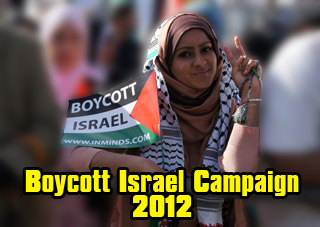
 Innovative Minds © 2014. All Rights Reserved. www.inminds.co.uk | ||||||
Food co-op in Rachel Corrie's hometown boycotts Israeli goodsNatasha Mozgovaya, Haaretz The Olympia Food Co-op announced last week that no more Israeli products will be sold at its two grocery stores. 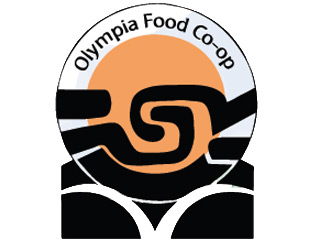 Americans are far more supportive of Israel than Europeans, and most initiatives to boycott Israeli goods or to divest funds from companies working with Israel are unsuccessful in the United States. But such projects have recently become more widespread, especially among students â although most divestment decisions by student bodies are not implemented on the colleges' management levels. Last week, the board of directors of the Olympia Food Co-op in Washington state decided that no more Israeli products will be sold at its two grocery stores in the city. "We met last Thursday for the board members meeting and a pretty large group â about 40 people â presented the boycott project and answered our questions," Rob Richards, a board member, told Haaretz. "A couple of board members were concerned about what will be the financial effect on the organization, but itâs minimal. For me personally there is a moral imperative that goes beyond any financial concern. So we decided to adopt the boycott which went into effect the next day." Asked whether the boycott includes all products made in Israel, or only in settlements, Richards explained: "As far as I know â it concerns any Israeli products. We exempted "Peace Oil" â itâs a joint product produced by the Palestinian farmers. Any product that is made by the company that works to improve the conditions of the Palestinians will be exempted." Richards says the decision drew no protests. "There was very little feedback from the staff that was against the boycott, but it seemed as minority opinion. We have two members on the board from the Jewish community who were supportive of the boycott â itâs pretty progressive town. I know thatâs not universal at the Jewish community." 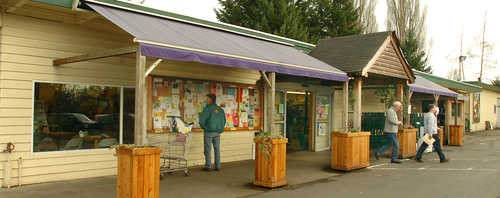 Olympia Food Co-op store There is a list of conditions that will lead to the end of the boycott, he says. "I am trying to be realistic â the Olympia Food Co-Op boycott is not going to change the Israeli policy, but I believe that these small drops will eventually have an effect. I would like to see more co-ops joining the boycott and more voices involved," he added. It is probably no coincidence that Olympia is the hometown of the International Solidarity Movement activist Rachel Corrie who was killed seven years ago in Gaza - a Caterpillar bulldozer ran over her as she tried to prevent demolition of a Palestinian house. Last month, the student body of Evergreen State College in Olympia, where she studied, passed two resolutions which called for the college foundation "to divest from companies that profit from Israel's illegal occupation of Palestine," and the second one called to ban the Caterpillar company equipment from campus. "The fact that it is the home town of Rachel Corrieâs parents and that it is represented by Rep Brian Baird (who has been to Gaza and is outspoken against Israel) makes this ripe for issues," said Jennifer Laszlo Mizrahi of The Israel Project, a pro-Israel organization. "So does the fact that it does not have a very organized pro-Israel community. This went under the radar screen at a time when most groups were focused on Iran sanctions and other macro issues. It is clear that the people who voted on this did not hear both sides of the issues. What is needed is education on facts." An Israeli diplomatic source told Haaretz that the boycott issue is being checked, and although it seems like a marginal incident. The source added that "we are concerned about every attempt to delegitimize Israel." The Olympia Food Co-Op boycott is only a tiny part of an effort that the BDS (boycotts, divestment and sanctions) movement is mounting on U.S. companies. On Monday, Jewish Voice for Peace activists planned to attend the TIAA-CREF annual meeting the company headquarters in New York City to deliver thousands of signatures calling on the company to divest its money from Caterpillar, Elbit, Motorola and some other companies, that, as JVP puts it, "profit from the violation of international law through home demolitions, the destruction of life sustaining orchards, the construction of roads and transit that only Israelis can use, the killing of civilians by drones, and many other injustices." In some places the mainstream Jewish community has reacted vigorously against boycott attempts, but many Israel supporters are worried that the battle "might be already lost at the campuses." Source: http://www.haaretz.com/blogs/focus-u-s-a/food-co-op-in-rachel-corrie-s-hometown-boycotts-israeli-goods-1.302980?localLinksEnabled=false Olympia Food Co-op boycotts Israel, pulls productsRolf Boone, The Olympian Nine of the co-op boardâs 10 members voted Thursday to participate in the international boycott. Harry Levine, a staff representative to the board, said he didnât take a stand on the issue. Not everyone on the co-op staff agrees with the decision, Levine said. He said that outside of his role as a board member, he supports it. âMy personal view is that boycotts can be effective tools in changing governments,â he said. âI personally support it, and Iâm an American Jew.â The board voted to boycott Israeli products as a way to âcompel Israel to follow international law and respect Palestinian human rights,â according to a statement the board released. The boycott announcement has been posted on the co-opâs website, www.olympiafood.coop, as well as at its two stores. Israeli products removed from the stores include gluten-free crackers, ice cream cones and a moisturizing cream, Levine said. 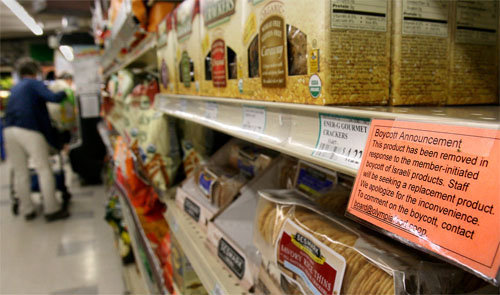 A small sign alerts customers of the removal of Israeli product from the Co-ops shelves This is not the first time that the 33-year-old co-op has taken part in a boycott, he said. It has boycotted products from Norway and China in objection to whaling and human rights violations. Members have been asking the board since at least 2008 to boycott Israeli products, Levine said. About 50 co-op members were at Thursdayâs board meeting, he said. The co-op has 15,000 to 20,000 members who are considered active. It costs $29 over a period of four years to join the co-op, although $24 of that is refundable if a member leaves. Since last weekâs vote, the co-op has received more positive than negative e-mails from all over the world about the decision, as well as phone calls, Levine said. An employee who answered the phone at the co-opâs east-side location Tuesday said the store had received a âfew hundred calls.â Some e-mails also were sent to The Olympian. Rabbi Seth Goldstein of Olympia, whose wife, Rabbi Yohanna Kinberg, contacted the paper by e-mail, wonât shop at the co-op as result of the boardâs decision, and the couple are considering âresigningâ as co-op members. They had shopped at the store for about eight years, he said. Goldstein said boycotts are counterproductive to a true and lasting peace in the Middle East, and he took issue with the process leading up to the boardâs decision. âThis is a pretty big issue,â he said. âThe membership was not informed in the decision process, which we feel is problematic.â Goldstein acknowledged that he was aware the co-op has a boycott policy, which is spelled out on the co-op website. âWhenever possible, the Olympia Food Co-op will honor nationally recognized boycotts which are called for reasons that are compatible with our goals and mission statement,â it states. Many co-op customers at the east-side store Tuesday said they were not familiar with the board decision; others said they were proud of the co-opâs activism but acknowledged that the Israeli/Palestinian issue is a thorny subject. Co-op member Katherine Davis-Delaney of Olympia said she was unhappy with the decision process on such a contentious issue, while Karen Eccles of Olympia said she supports the co-op but stopped short of taking sides on the issue. âI support the co-opâs activism with regard to social justice,â she said. Read more: http://www.theolympian.com/2010/07/21/1310754/israel-cleaned-from-co-op-shelves.html#ixzz0x83CBdZF Source: http://www.theolympian.com/2010/07/21/1310754/israel-cleaned-from-co-op-shelves.html 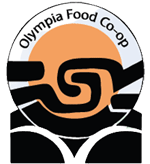 Olympia Food Co-op: Boycott AnnouncementOlympia Food Co-op The Board of Directors has decided that the Olympia Food Co-op will boycott Israeli made products and divest from any investments in Israeli companies. The Co-op would stop carrying the Israeli products it currently sells and would not stock new products from Israeli companies. If the Co-op has money invested in Israeli companies or bonds, we would terminate those investments. We would refrain from dealing with non-Israeli companies that sell products or services to Israel that are used to violate the human rights of the Palestinians. Members requested that the Co-op honor the international call for boycott. The Board made the decision while following the Olympia Food Co-op Boycott Process (available at the Co-op website at www.olympiafood.coop). The Board consulted and used the Co-op Mission Statement and the By- Laws to guide in making this decision: From the Mission Statement:Support efforts to foster a socially and economically egalitarian society From the By-Laws:Adopt policies which promote achievement of the mission statement and goals of the Cooperative Why boycott?Boycott is a nonviolent tool for social change that has been tested and proven effective in a variety of campaigns. It is an essential part of the engaged civilianâs toolkit and is an empowering process that everyone can participate in. There is a rich history of boycotts for social change, from the Indian âSwadeshiâ boycott of British goods, to the Montgomery bus boycott in the 1950s, to the California grape boycott in the 1960s, or the more recent Coalition of Immokalee Workers boycott of Taco Bell. The Olympia Food Co-op has engaged in a number of nationally and internationally called boycotts including: products from China (human rights abuses); products from Norway (whaling abuses); products from Colorado (anti gay legislation); Gardenburgers (farmworker abuses) and more. Perhaps the best example of this nonviolent tactic used to change the policies of a country is the Boycott, Divestment, and Sanctions campaign (BDS) on apartheid South Africa. As Nelson Mandela has pointed out; âBoycott is not a principle; it is a tactic depending upon circumstancesâ¦. A boycott is directed against a policy and the institutions which support that policy either actively or tacitly. Its aim is not to reject, but to bring about change.â Why an Israeli products boycott?The Israeli products boycott is part of a nonviolent international grassroots campaign of boycott, divestment, and sanctions (BDS) to compel Israel to follow international law and respect Palestinian human rights. The campaignâs clearest statement comes from a 2005 call for international action, signed by nearly 200 Palestinian civil society organizations and endorsed by prominent activists from Desmond Tutu to Arundhati Roy to Naomi Klein. Isnât this âanti-Israelâ?Criticizing US foreign policy is not anti-American and Israeli supporters of BDS are not anti-Israel. Supporting BDS is no more anti-Israel than boycotting South Africa is antiâSouth Africa or anti- White or boycotting China is anti-Chinese. Boycott is a nonviolent people-powered tool for change. This is about working for peace and justice in the region. When BDS was leveled on South Africa, the goal wasnât to âdelegitimizeâ South Africa, to eliminate white South Africans, or to destroy South Africa. The goal was specific: To end Apartheid and the human rights abuses associated with it. That was the goal. BDS was the tactic. Why should the Co-op honor the boycott?The Olympia Food Co-op operates with an awareness of economic, ecological, and social justice, which is imbued in its mission and in its policies. The Co-op has a history of factoring in social ethics to its merchandising decisions â choosing not to carry certain products due to a workersâ strike or an existing boycott campaign. The Co-op has also refused to stock items that contain packaging construed as racist or sexist.Because the Co-op understands that social ethics and social justice are inseparable from providing the community with goods, it is only appropriate that the Co-op honors the boycott campaign, which fits perfectly with its existing boycott policies. Honoring the boycott help the Co-op live up to its goals and mission statement. What ends the boycott?As outlined in the Palestinian Call for Boycott, the boycott will end when:1. Israel ends its occupation and colonization of all Arab lands and dismantles the Wall; 2. Israel recognizes the fundamental rights of the Arab-Palestinian citizens of Israel to full equality; 3. Israel respects, protects and promotes the rights of Palestinian refugees to return to their homes and properties as stipulated in UN resolution 194. As a member, how do I give input on this decision?The Board welcomes all feedback from members. You can contact us by emailing board@olympiafood.coop or by calling our business office at 357-1106 ext 13Source: http://www.olympiafood.coop/20100716-BoardBoycottIsraelProducts.pdf
 Olympia Food Co-op Joins Boycott of Israeli-Made ProductsOlympia Food Co-op Olympia Food Co-op Joins Boycott of Israeli-Made Products On Thursday July 15th 2010 the Board of Directors of the Olympia Food Co-op decided to boycott Israeli made products and divest from investments in Israeli companies. The decision to boycott was made based on the Co-opâs mission statement in accordance with our bylaws, and based on information from respected international sources. Olympia, WA. (Olympia Food Co-op) July 21, 2010:The Olympia Food Co-opâs Board of Directors has decided to boycott Israeli-made products and divest from investment in Israeli companies.The boycott of Israeli-made products is part of a long-history of social justice work carried out by the Co-op in accordance with their mission. In addition to âprovid(ing) wholesome foods and other goods and servicesâ the Co-op âstrive(s) to make human effects on the earth and its inhabitants positive and renewing and to encourage economic and social justice.â The co-op also currently boycotts products made in China and Coca-Cola products, and has taken part in other boycotts in the past. The decision to join the boycott of Israeli-products was based on credible information about human rights abuses from respected international groups such as the United Nations, Red Cross, and Amnesty International. The boycott asks that: 1. Israel end its occupation and colonization of all Arab lands and dismantles the Wall; 2. Israel recognize the fundamental rights of the Arab-Palestinian citizens of Israel to full equality; 3. Israel respects, protects and promotes the rights of Palestinian refugees to return to their homes and properties as stipulated in UN resolution 194. This decision does not represent any other opinions toward the nation of Israel nor does it indicate approval of violence used by either side of this conflict. The Israeli-product boycott was presented to the co-op by co-op members who were also involved in the Olympia BDS (Boycott, Divest, and Sanctions) group. The boycott was in line with the Co-opâs stated boycott policy. The Board made the final decision after members of the staff collective were unable to reach full consensus on the boycott. The boycott is a non-violent tool for social change with a long history, from the Indian âSwadeshiâ boycott of British goods, to the Montgomery bus boycott in the 1950s, to the California grape boycott in the 1960s, and the Boycott, Divestment, and Sanctions campaign on apartheid South Africa. About the Olympia Food Co-op:The Olympia Food Co-op is a member-based, not-for-profit, natural foods grocery store with two locations in Olympia, WA. The Olympia Food Co-op has provided healthy, organic and local food to the Olympia area since 1977, with an emphasis on promoting social and environmental responsibility. The stores are collectively managed and largely volunteer-run.Source: http://www.olympiafood.coop/BoycottPressRelease-20100721.pdf
Israeli product boycott debate cordial, passionateRolf Boone, The Olympian OLYMPIA - About 300 people filled Olympia Center on Thursday night for a passionate debate on a recent controversial decision by the Olympia Food Co-op board to boycott Israeli-made products. Nine of the 10 board members were at the meeting, and co-op members and nonmembers lined up early for the 6 p.m. start. By 5:30 p.m., more than 100 people stood in line; some had arrived as early as 3 p.m., said Dr. Muhammad Ayub, who spoke in support of the boycott. Ayub said he arrived at that time and was the fourth person in line. Public testimony didnât get under way until 7 p.m., and it wasnât clear whether the meeting would extend beyond its scheduled completion time of 8:30 p.m. 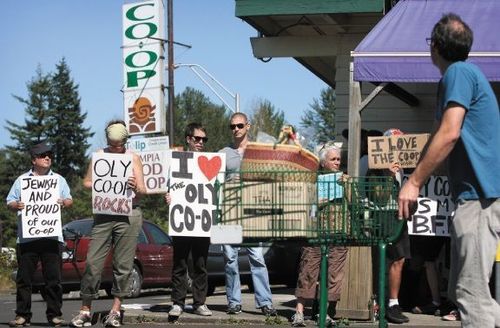 Olympia Food Co-op members showing support for the boycott of Israeli goods Maralise Quan, executive director of the Pierce County Dispute Resolution Center, spelled out the ground rules and set the tone for the meeting. She asked for tolerance and that no speaker be disrespected. Rather than applaud, she asked that people show their support for a speaker by waving their hands in the air. One by one, board members introduced themselves to the audience, but only board member Ron Lavigne spoke at length, saying the board understood its decision would be controversial but was there âto address the hurt and anger and to try and heal the community.â About 115 people signed up to speak at the meeting, and speakers were asked to limit their comments to three areas: the decision to boycott, the process leading up to the boardâs decision to boycott and how the co-op community should proceed with the issue. During the first hour, about 20 people spoke in support of the boycott, and 10 people spoke against it. Boycott supporters struck a theme Thursday night, with many saying that the boardâs decision was a âbeacon of hopeâ for the Palestinian people. Before he spoke publicly, Ayub said the boycott will be good for Israel in the long run, just as an international boycott was for eliminating apartheid in South Africa. âWe donât tolerate bullying in schools; why should we tolerate it in world politics?â he said. But others in the audience zeroed in on what they view as the lack of public process leading up to the boardâs decision, saying 10 board members canât speak for thousands of co-op members. âNo situation is so urgent that we must exclude voices,â David Scherer-Water told the audience. Noah Sochet, who said he has worked at the co-op for six years, said the boardâs decision was not made overnight, that the idea of boycotting Israeli products started two years ago. âWeâve been talking publicly about this for along time,â he said. Some boycott supporters suggested that those against the boycott launch a member-initiated ballot to overturn the boardâs decision. Thatâs what longtime member Jeff Trinin said he plans to do. Trinin, also unhappy with the process, has collected 350 signatures that he soon plans to submit to the board for consideration, he said. The tone of the meeting largely was cordial, although some emotions began to fray after the first hour. Co-op member Tibor Breuer finally had had enough, yelling an expletive before he stormed out of the meeting. The controversy got its start July 15, when the 10-member Olympia Food Co-op board voted to approve a boycott of Israeli products. Nine board members voted to approve the boycott, while a staff representative to the board, Harry Levine, chose not to vote because not all staff members agreed with the boardâs decision. The board voted to boycott Israeli products as a way to âcompel Israel to follow international law and respect Palestinian human rights,â according to a statement the board released. The boycott announcement has been posted on the co-opâs website, www.olympiafood.coop, as well as at its two stores. Following the vote, the co-opâs two Olympia stores removed gluten-free crackers, ice cream cones and a moisturizing cream. Small signs were affixed to shelves at the stores, explaining that the products had been removed. The items were donated to the Thurston County Food Bank. This is not the first time that the co-op has been involved in a boycott. The board has a boycott policy that is spelled out on the co-op website, and it has used the policy to protest whaling by Norway and Chinaâs human-rights record in Tibet. The 33-year-old co-op has 15,000 to 20,000 members who are considered active. It costs $29 over a period of four years to join the co-op, although $24 of that is refundable if a member leaves. The boardâs decision mobilized the South Sound Jewish community, which protested at the co-opâs eastside location in the days following the July 15 decision. They eventually were joined by supporters of the boardâs decision, with both groups demonstrating outside the eastside store. Jewish residents said they felt left out of the boardâs decision-making process, while supporters made clear that they were not targeting Jews, but the Israeli government.
Olympia Food Co-op Boycotts Israeli GoodsSteve Niva, Counterpunch On July 15, the Olympia Food Co-op Board of Directors decided to boycott Israeli goods at their two locations in Olympia, Washington. The July 15 meeting was packed with Co-op members when the Board reached this consensus. The Co-op becomes the first US grocery store to publicly join the international grassroots movement for boycott, divestment, and sanctions (BDS) on Israel for its human rights abuses. AC / JSC Critics of the Olympia Food Co-opâs recent decision to boycott several Israeli products until Israel ends its inhumane occupation of Palestinian land and its suppression of Palestinian human rights have no moral or ethical basis to criticize the Food Co-op unless they can offer an alternative strategy to end Israelâs occupation. Until they do so, they are simply embracing and providing cover for the injustices of Israelâs occupation, whether they are willing to admit it or not. Everyday, Israeli soldiers arrest and assault Palestinians in their own cities and towns, many of whom are tortured or forced into becoming collaborators with the occupation. Everyday, Israeli armored bulldozers destroy Palestinian homes, orchards and wells in order to clear land to build more Jewish settlements and their massive road infrastructure on Palestinian lands. Everyday, Israeli checkpoints and walls deny Palestinians access to essential food and medical supplies and deny them the right to travel freely between their own towns and to conduct basic life functions. Everyday, Palestinian lives are torn apart by Israelâs occupation. All of these practices are illegal under international law and all are condemned by international human rights organizations and institutions. And for what reason? It is now clear that the primary function of these Israeli actions is not security but to steal Palestinian land for Israeli settlements and repress Palestinian opposition to this project, forcing Palestinians to live in ever shrinking enclaves. If Israel truly wanted security and peace rather than Palestinian land, it could easily accept the internationally accepted terms for peace and withdraw all of its over 400,000 settlers and soldiers to its 1967 borders with international guarantees for its security. But Israel has chosen settlement and stealing Palestinian land over peace and security. As with other national liberation movements, some Palestinians have indeed committed reprehensible crimes against Israelis, but the moral burden is always greater for the more powerful and oppressive, as it always has been in cases of colonization and dispossession. Many members of the Olympia community have lived and worked with Palestinians enduring these inhumane conditions and have witnessed Israelâs brutal occupation and dispossession of Palestinian people for themselves. They know there is no justification for Israelâs occupation. Many others in our community have also come to the same conclusion. They have long sought avenues to struggle for justice and to raise awareness on this issue only to see Israelâs occupation deepen and Palestinian suffering increase. They have seen the U.S. government fail time and again to advance an agenda for justice and ending Israelâs occupation, with Obama as no exception. They have also seen courageous Israeli peace activists marginalized and suppressed within Israeli society and Israel recently elect the most right-wing government in its history. As a result, many are now embracing a new strategic approach in which they are using the familiar tools of non-violent social justice activism to raise awareness and pressure Israel directly to end its occupation. This strategic approach, inspired by a call by Palestinian activists several years ago and embraced by many Israeli and international peace activists, is often called BDS (boycott, divestment and sanctions). The basic premise of this strategy is to raise the economic, social and moral costs for Israel as a way to pressure Israeli society and politicians to do the right thing, which is to end its occupation. It is a strategy that no longer waits for governments, whether the U.S. or European, to use their immense leverage to pressure Israel to do the right thing, but rather empowers all of us as citizens to use whatever power we have directly, and as a way to pressure our own governments to act as well. BDS contends that with no external pressure, Israel will not voluntarily relinquish control of the Palestinian territories or negotiate a just resolution if there are no negative consequences for maintaining the status quo. Nevertheless, the recent decision of the Olympia Food Co-op to embrace this BDS strategic approach by boycotting several Israeli products has brought out numerous critics who condemn its actions and threaten boycotts of their own. But unless these critics are offering an alternative strategy to end Israelâs occupation they are simply legitimating and defending the status quo of Israelâs occupation and thus embracing injustice. They are in effect saying that stealing Palestinian land for Israeli settlements, destroying Palestinian homes and orchards, torturing and turning Palestinians into collaborators with the occupation, and starving or denying medical aid to Palestinians is acceptable to them. Critics of the Food Co-op decision are therefore faced with a clear choice. If they are indeed opponents of Israelâs occupation and its injustices, then they should cease their criticism and engage in a strategic dialogue with supporters of the Food Co-opâs boycott of Israeli products over the best way to end Israelâs occupation and offer a better alternative. They could point to several options that have been mentioned by principled and ethical critics of the BDS strategy. Some have argued that a better strategy would be to build a new domestic movement in the United States to pressure the U.S. government to advance a peace plan whose central component is an end to Israelâs occupation in all its forms by removing all its settlements, soldiers, checkpoints, and walls and fences from Palestinian land occupied in 1967. Others argue that the best way to end Israelâs occupation is to build massive support for Israeli domestic opposition to Israelâs occupation; support for Israeli feminist peace activists, soldiers who refuse to defend an occupation and the many Israelis who are protesting Israelâs settlements and its horrendous wall that is carving up Palestinian lands. Both of these strategies would require radically transforming many peopleâs relationship to Israel and demand bold action and courage to challenge all the entrenched interests who claim to be âpro-Israelâ but merely provide cover for injustice. And both of these options are facing serious challenges at this time, so the burden would be on opponents of BDS to explain how and why they could be more successful. Perhaps all of them are necessary and needed. But the fact that we do not see these strategic ideas brought forward and debated by critics of the Food Co-op indicates that as of now, most critics are either in denial about the injustices of Israelâs occupation or unwilling to embrace and act on their principles. They appear to be more concerned about protecting their own image of Israel or criticizing anyone who makes them feel uncomfortable by confronting their own complicity in injustice. Critics of the Food Co-op cannot have it both ways. One cannot critique a principled and promising strategic approach to ending injustice without an alternative and claim to be acting on an ethical or moral basis. The crimes of Israelâs occupation are too well known and documented to merit any more dialogue and debate on that matter. It is manifestly clear that not only does Israelâs occupation constitute one of the worldâs major injustices but also that it does little to bring Israel the security and peace that many of its supporters claim to desire. The only dialogue worth having now is over the most effective strategy to end Israelâs occupation. As for the critics of the Food Co-op who do not want to engage in a strategic dialogue about ending Israelâs occupation, they should just be honest and admit that they have no interest in justice and that killing and imprisoning Palestinians for the sake of Israeli territorial expansion is acceptable to them. They should openly embrace Israelâs brutal occupation and settlement expansion in all its forms and accept its consequences. At least that would be principled, if cruel and inhumane. But it doesnât mean that anyone should listen to them any longer. Steve Niva is an Olympia community member who teaches Middle East studies and international politics at The Evergreen State College. He can be reached at NivaS@evergreen.edu.
Why I Support The Olympia Co-Op BoycottRabbi Lynn Gottlieb, Mondoweiss Dear friends, The Olympia Food Co-op boycott of Israeli products (except for fair trade olive oil) has generated much controversy and emotion. I do pray for healing and understanding among those who support and those who oppose such a boycott in the community of Olympia, Washington and around the world. All of us must stand together and mourn the loss of life generated by this conflict. May their memories be a blessing. The Food Co-op and many concerned citizens around the world have asked the question: How do we transform the Israeli-Palestinian conflict through the use of nonviolence? What is meaningful action? While negotiations, lobbying and dialogue occur, those who have been directly impacted by occupation, the Palestinians, have called upon the world to engage in meaningful nonviolent action to apply pressure upon Israel so that Israel cannot conduct the business of occupation as usual. Have we all not seen and read about life in Palestine under occupation? The Goldstone report, B'tselem, Gisha and many other organizations and individuals have documented the systematic violation of Palestinian human rights in the past several years. How do we both construct peace and engage in non-cooperation with policies that systematically violate human rights on a daily basis? Boycott is a time honored method which was the catalyst that ended legal segregation in the United States. Boycott is the primary tool of those engaged in nonviolent resistance to systematic injustice. Boycott targets unjust policies. It is not about 'the right to exist'; Everyone has the right to 'exist'. Rather, boycott is a tool that focuses on the right to live a life free from a policy of land seizure, internal transfer, administrative detention and other forms of violent and harmful actions levied against people who do not want to give up their land. I want to explain my personal reasons for supporting the decision of the Co-op not to limit their boycott to the West Bank. I believe that the articulation of a position that there is a line that separates products 'made in the West Bank' and those 'made in Israel' is difficult to stand by if you look deeply at the issue. 1) The mechanics of occupation is not limited to the West Bank. I'm sure you've all heard about the 300 bedouin Palestinians made homeless two days ago, in the Negev settlement known as al-Araqib, homes destroyed by the way with a Caterpillar bulldozer flying an Israeli flag. This is an ongoing reality of Palestinian life under occupation, that is, the loss of land. Now, almost 80% of of West Bank land is considered Israeli State land. Palestinian families are continually being driven from their homes. Furthermore, Israel inside the green line is the agency of occupation and conducts, plans, prepares and executes aspects of the occupation from inside the green line. 2) Israel prevents Palestinian exports from reaching their destination all the time. Trying to sell West Bank products in Israel or abroad is a seriously challenging issue. Bottles are smashed, fruit is left to rot, clothes are ruined. This happens in the intersection of borders. Palestinians and their products have no right to any border passage. All movement of people and goods is controlled by Israel. 3) Lest we forget Gaza and the closure. 60% of Gazans suffer food insecurity. That is truly a stunning number. 90% of the products sold in Gaza come from Israel. Why? No manufacture is allowed in Gaza due to shortages of materials. Farmers are shoot dead in their fields all the time. Fisherman are prevented from fishing. The closure has not been lifted. Hence, the application of boycott until such time as the borders are open and people and goods can come and go according to international standards of passage. 4) While I believe we must be understanding, compassionate, gracious and clear in the use of our language when engaging with those who do not support nonviolent means of conflict transformation such as boycott, BDS is really about focusing on Israel's occupation of Palestinian towns, villages and farm land including East Jerusalem, the Negev, the Galilee, Ramlah, Jaffo, Lod, Nazereth, Acco and the West Bank. The BDS movement has been very clear about including Palestinians living inside Israel as part of the educational effort around human rights issues facing the Palestinian community inside the green line. 5) All use of anti-Semitic language or rhetoric, or the slandering of others as anti-Semites or self-hating Jews must be opposed. Our common ground, support of those who suffer indignities, should be the focus. Supporters of boycott are asking people to shift loyalties from partisan support of one side or the other to positions based on universal standards of human rights. Those who support boycott are creating a broad based multifaith and multicultural coalition that crosses boundaries and unites people based on what kinds of behavior should not be tolerated by nation states according to principles of international law. My own activism includes standards of food justice based on access and human rights in the United States as well as other countries. I do not buy a range of products based on human rights standards. The Food Co-op shares this ethic. Fair Trade standards underlay their decision. My support for the Olympia Food Co-op is for these reasons. Groups that are limiting their boycott to 'Israeli settlement products', or to corporations that profit from occupation (such as the JVP campaign) can still reach out in support of those who have taken a broader stance. This is a movement issue. Finally, there is the matter of Rachel Corrie. Like Rachel, those who decided to boycott Israeli products have taken a meaningful action that supports their desire to end occupation. They are moved to action from on the ground experiences. As a forty year veteran of this issue, I, too have witnessed what is happening on the ground and I am moved to be part of the effort to change Israeli policy. I do this from a love of people. I believe that Jewish tradition stands with me. Not profiting or benefiting from the fruits of violence is a central tenet of a life committed to nonviolence. Since the Jewish state is acting in my name, I am forced to withdraw support for Israeli food products until the closure is lifted, the policy of land seizure ends and negotiations are taken up in a meaningful way. This does not mean I am cutting off my relationships to the people I love on both sides. May all efforts to construct peace continue. Meaningful nonviolent resistance to injustice is part of the equation. The Food Co-op community went beyond endless discussions of exactly how one should act to resolve conflict, and they acted. Whether people agree or disagree with the particulars of any given action, at least support the courage of people who are willing to act in behalf of those who are suffering on a daily basis. May the process of reparative justice truly begin. L'shalom, Lynn Gottlieb Source: http://www.eurasiareview.com/201008046465/why-i-support-the-olympia-co-op-boycott.html Palestinian Civil Society Salutes Olympia Food Co-opâs Decision to Boycott Israeli GoodsOccupied Palestine Palestinian farmers unions, agricultural organizations and popular committees struggling against Israelâs colonial Wall and settlements warmly salute the historic decision taken on July 15th [1] by the Olympia Food Co-op to remove all Israeli products from its shelves. The Olympia Food Co-op has set a historic precedent by becoming the first US grocery store to publicly join the global grassroots campaign for boycott, divestment and sanctions (BDS) against Israel until it ends its human rights violations and oppression of the Palestinian people. Coming a few short weeks after Israelâs lethal attack on the Freedom Flotilla and in light of its ongoing illegal siege on Gaza, the Co-opâs decision to boycott all Israeli products reflects the growing sentiment in international civil society, including in the US, that ending Israelâs impunity and pressuring it to comply with its obligations under international law have become of undeniable urgency [2]. Through its ever growing colonial settlements, the Wall and hundreds of military checkpoints in the occupied Palestinian territory, Israel has systematically dispossessed Palestinians of their most fertile lands or separated them from them, expropriated the most important water aquifers and denied millions of Palestinians the right to move or trade freely, thereby rendering development impossible and stifling the growth of Palestinian agriculture in particular. Israelâs lethal siege on Gaza has almost completely destroyed the agricultural sector there. As of June 2009, a total of 46% of agricultural land in the Gaza Strip was assessed to be inaccessible or out of production owing to Israelâs wanton destruction of these fertile lands during its war of aggression on Gaza in 2008-2009 or its marking of large agricultural areas as âsecurity buffer zones.â [4] Moreover, water resources in Gaza are critically insufficient, mainly due to Israelâs destruction of infrastructure during its Gaza attack, forcing farmers to use salty and polluted water from agricultural wells for irrigation. This and the fact that 90-95% of the Gaza water supply has become polluted to the extent that is not suitable for human consumption have caused major health problems to Gazaâs population, especially among children and other vulnerable sectors of society [5]. While the agricultural sector in Gaza has the potential to export 2300 tons of strawberries, 55 million carnation flowers and 714 tons of cherry tomatoes per annum, there has been close to zero export activity in Gaza as a result of Israelâs blockade. Even with such high agricultural potential, Israelâs lethal siege has left the people of Gaza with a 61% prevalence of household food insecurity [6]. The destruction of Palestinian livelihoods and the denial of supply of essential goods to Gaza are not a side effect, but rather a tool consciously used by Israeli policy makers. In fact, the siege of Gaza is âa central pillarâ[7] of the Israeli policy. Dov Weissglass, top political advisor to former Israeli prime ministers Ariel Sharon and Ehud Olmert stated that âthe idea is to put the Palestinians on a diet but not to make them die of hungerâ[8]. While Israel continues to ravage Palestinian livelihoods with full impunity the Olympia Food Co-opâs decision to boycott Israeli products presents a moral, effective and timely response that promises, if emulated across the US, to significantly challenge Israelâs criminal impunity, furthering the chances for respect for human rights and a measure of justice for the Palestinians. The Palestinian-led global BDS movement, which is inspired by the South African anti-apartheid struggle and the U.S. civil rights movement, has proven over the past five years of its existence that it is the most effective way to gradually and consistently mobilize concerted international civil society efforts to support the Palestinian struggle for freedom, justice and sustainable peace [9]. This can only be achieved by compelling Israel to end its occupation, apartheid, and persistent denial of the right of return for the Palestinian refugees. The Olympia Food Co-op has demonstrated its courage and commitment to human rights by adopting a concrete and courageous measure in a show of genuine solidarity with the indigenous Palestinian people. We sincerely hope that their decision to stand with justice will not waver under the immense intimidation and bullying that Israel lobby groups will undoubtedly unleash against them. We believe that the most effective support conscientious individuals and groups across the U.S. can provide to the Olympia Co-op is by starting their own local BDS campaigns that follow Olympiaâs lead, branding Israeli products and services everywhere as stained with injustice and war crimes, just as South African products were treated during apartheid . Only thus can justice prevail and peace be attained and sustained. Endorsed by: * General Union of Palestinian Peasants and Co-op Groups [1] http://www.olympiabds.org/2010/olympia-food-co-op-removes-israeli-goods-from-shelves-first-us-store-to-institute-boycott.html [2] For more information, see the Palestinian BDS National Committeeâs statement underlining the urgency of intensifying BDS after Israelâs attack on the Flotilla: http://bdsmovement.net/?q=node/728 [3] Factsheet: Threatened Villages â Palestinian population centres between isolation and expulsion, http://stopthewall.org/factsheets/1632.shtml [4] OCHA report: http://www.reliefweb.int/rw/rwb.nsf/db900sid/MDCS-85SHU3?OpenDocument&rc=3&cc=pse [5] Amnesty international report: www.amnesty.org.uk/uploads/documents/doc_19771.pdf [6] OCHA report: http://www.reliefweb.int/rw/rwb.nsf/db900sid/MDCS-85SHU3?OpenDocument&rc=3&cc=pse [7] http://news.bbc.co.uk/2/hi/middle_east/8654337.stm [8] http://electronicintifada.net/v2/article9276.shtml Dov Weissglass was advisor to Israeli prime ministers Ariel Sharon and Ehud Olmert. [9] BNC statement celebrating 5 years of BDS: http://bdsmovement.net/?q=node/755
Archbishop Desmond Tutu Endorses Olympia Food Co-opâs Boycott of Israeli GoodsOlympia BDS (Olympia, WA â July 27, 2010) The Olympia Food Co-opâs decision to honor the international call for boycott of Israeli goods has inspired an inundation of phone calls, e-mails, and petition signatures supporting the solidarity gesture, including an endorsement from South African Archbishop Emeritus Desmond Tutu. 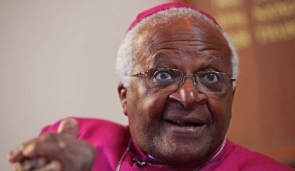 South African Nobel laureate Archbishop Desmond Tutu The Archbishop endorsed the boycott with the following statement: âI, Desmond Tutu, fully support and endorse the Olympia Food Co-opâs boycott of Israeli products. The Olympia Food Co-op has joined a growing worldwide movement on the part of citizens and the private sector to support by non-violent tangible acts the Palestinian struggle for justice and self-determination. Cooperatives have a long history of working for and with the oppressed to strive for a better world, and now Olympia Food Coop has been the first to build off of that legacy in support of freedom for Palestinians. I encourage other cooperatives, grocers, and businesses to follow their courageous example of boycotting Israeli goods and for shoppers to support their principled stand.â Palestinian Civil Society EndorsementThe Co-op has also received the endorsement of all major Palestinian agricultural and farmersâ unions. In a letter received July 26, the organizations make the following statement: âThe Olympia Food Co-op has demonstrated its courage and commitment to human rights by adopting a concrete and courageous measure in a show of genuine solidarity with the indigenous Palestinian people [...] We sincerely hope that their decision to stand with justice will not waver under the immense intimidation and bullying that Israel lobby groups will undoubtedly unleash against them. We believe that the most effective support conscientious individuals and groups across the US can provide to the Olympia Food Co-op is by starting their own local BDS (Boycott, Divestment, and Sanctions) campaigns that follow Olympiaâs lead, branding Israeli products and services everywhere as stained with injustice and war crimes, just as South African products were treated during apartheid. Only thus can justice prevail and peace be attained and sustained.â Endorsers of the letter included the General Union of Palestinian Peasants and Co-op Groups, Union of Palestinian Farmers, Grassroots Palestinian Anti-Apartheid Wall Campaign (STW), Palestinian Agricultural Relief Committees, Union of Palestinian Agricultural Engineers, Union of Agricultural Work Committees, and National Committee for Popular Resistance, Popular Committees against the Wall and Settlements in Nilâin, Bilâin, Al-Maasara, Nabi Saleh, Budros, Beit Jala, and Wadi Rahal. Outpouring of SupportThe Olympia Food Co-op has been the focus of international attention since the July 15 decision to honor the Palestinian call for boycott, divestment, and sanctions (BDS) for human rights. The Co-op became the first US grocer to publicly join this call. Richard Falk, Nobel Peace Prize Nominee and UN Special Rapporteur for the Occupied Territories states, âThe Olympia Food Co-op boycott of Israeli products bravely joins a growing worldwide movement on the part of citizens and the private sector to support by non-violent tangible acts the Palestinian struggle for justice and self-determination.â âRachel Corrie took a stand in March 2003 for a Palestinian family whose home was threatened with demolition,â says boycott supporter Cindy Corrie, the mother of the slain human rights activist. âWe believe it fitting that the Olympia Food Co-op, of which she was a member, now stands with millions throughout the world who say, âEnough.ââ âThis outpouring of support demonstrates the global impact of decisions made in Olympia,â says boycott supporter Chance Kroll. âAs a co-op member it makes me keenly aware that what I buy makes a tangible difference to the Palestinian and Israeli peacemakers who risk imprisonment or even death for their work.â The online petition in support of the boycott has received over 1600 signatures from the community and internationally. The list currently grows by about 200 signatures each day. A list of other notable endorsers is attached, and can be found at www.olympiabds.org/get-involved/petition-in-support-of-the-olympia-food-co-op.html. Outreach EventThe Palestinian- and Israeli-led global BDS movement, inspired by the South African anti-apartheid struggle and the U.S. civil rights movement, has proven the most effective way to support the Palestinian struggle for freedom, justice and sustainable peace. OlympiaBDS has organized an educational talk on the effectiveness of boycott, divestment and sanctions in the campaign to support the human rights of Palestinians. Olympia residents are invited to attend âWhy Boycott? Why Divest?â, August 4, 2010 at 7:00pm at Traditions Fair Trade, 300 5th Ave in Olympia, Washington. The event is free of charge. Press Contact: Notable Endorsers of The Olympia Food Co-opâs Boycott of Israeli GoodsA partial list of the more than 1600 signatories of the online petition in support of Olympia Food Co-opâs boycott of Israeli goods (a complete list is available here): * Archbishop Emeritus Desmond Tutu
Rachel Corrie Foundation â Statement of Support of the Olympia Food Co-op Boycott of Israeli GoodsWe at the Rachel Corrie Foundation for Peace and Justice salute the Olympia Food Co-op Board of Directors for their recent decision to institute a boycott of Israeli goods. We also applaud community and co-op members who have advocated on behalf of this measure. In our work, we have been witness to the lack of intention or will on the part of the Israeli and U.S. Governments to secure freedom, equality, self-determination and security for all in Israel/Palestine, and the inability of the international community to do so. We are keenly aware of Palestinians who have lived under oppression for over sixty years and of their Israeli counterparts who have felt the consequences of their governmentâs unjust policies â many of whom have struggled in solidarity with Palestinians for decades to change these policies.  Rachel Corrie It has been too long. It is right for citizens of the world to act and to signal that we will not continue to tolerate this outrage that has brought such pain and grief to so many for so long. Step by step, action by action, we must build support for justice and equality for all in Israel/Palestine â support that government leaders will not be able to dismiss. Rachel Corrie took a stand in March 2003 for a Palestinian family whose home was threatened with demolition. We believe it fitting that the Olympia Food Co-op, of which she was a member, now stands with millions throughout the world who say, âEnough.â Thank you, Olympia Food Co-op, for your courage and resolve. Respectfully, Cindy Corrie on behalf of the Rachel Corrie Foundation Source: http://www.olympiabds.org/2010/rachel-corrie-foundation-statement-of-support-of-the-olympia-food-co-op-boycott-of-israeli-goods.html
Related ArticlesAlso Of InterestPage URL: http://inminds.co.uk/article.php?id=10474
|
|
Support Us
If you agree with our work then please support us.Campaigns INMINDS Facebook Live Feed Latest Video's
INMINDS Twitter Feed Tweets by @InmindsComFeatured Video's
You need Flash player 8+ and JavaScript enabled to view this video.
[all videos (over 200)..] Featured MP3 Podcast 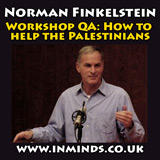 "Its important to choose a strategy that doesn't end up diverting attention from the issue.. the other side wants nothing more than to divert attention from what the record shows, what the human rights record shows, what the UN record and so forth - they don't want to talk about that because once they start talking about that they loose. They'd rather talk about anti-Semitism, the Nazi holocaust - anything accept Israel and Palestine. With that in mind you have to be careful that you don't embark on a tactic which is going to end up diverting people from Israel-Palestine.. You don't' want to choose grey areas, you always want to choose black and white areas where there is no room for discussion, where there is no room for debate. This is black and white: World Court decision [wall and settlements illegal] 14 to 1. Human rights issues - Amnesty says Israel tortures, Human Rights Watch says Israel tortures, B'Tselem says Israel tortures, everyone says it - its black and white. And the other side has to end up with some ridiculous proposition as Professor Dershowitz put it 'they're all lying'." Academic scholar, author of 'Beyond Chutzpah - On the Misuse of Anti-Semitism and the Abuse of History' Worshop on the best strategy to help the Palestinians pt2 (QA), FOSIS Jan 2008 [87min / 33Mb] [all podcasts..] Newsletter Feedback |
 |
 |























